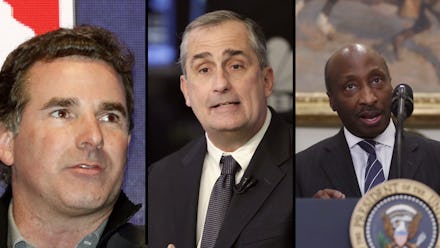Trump ditches CEO councils — after they ditch him

President Donald Trump announced in a tweet Wednesday that he was dissolving both his Manufacturing Jobs Initiative and his Strategic and Policy Forum — two groups of business executives created to advise the president on jobs and economic policy. The move follows a wave of resignations and departures from the councils after Trump appeared to defend the violent white nationalist protest in Charlottesville, in which one woman, Heather Heyer, died.
But the CEOs had been dropping off like flies long before Trump’s tweet. Blackstone CEO and Strategic and Policy Forum head Steven Schwarzman called Trump to tell him the group was disbanding shortly before the president’s tweet, according to the Wall Street Journal. And several CEOs, including the heads of 3M, Campbell Soup, Merck, Intel and Under Armour, had already resigned from the manufacturing council earlier this week. Tesla CEO Elon Musk resigned from the manufacturing council back in June.
Even disbanding the two councils didn’t stop the flow of resignations. Johnson & Johnson CEO Alex Gorsky put out a statement announcing his departure shortly after Trump’s announcement, and was quickly followed by Corning CEO Wendell Weeks and General Electric Chairman Jeff Immelt.
Why did Trump break up with the CEOs so publicly? “This was actually a play at saving face, for himself, as well as taking a move away from leaders who wanted to publicly demonstrate their disdain,” Nicholas Pearce, a professor of management at the Kellogg School of Management at Northwestern, said in an interview. “What this does is allow him to reassert his dominance in a time when he was being made to look weak and alone.”
Other communications and management experts consulted by Mic expressed similar sentiments, noting that as departures mounted, pressure on the remaining council members was likely to increase. “They’re like lemmings,” said Jeffrey Seglin, Director of the Communications Program at the Harvard Kennedy School of Government, who added, “Now there’s no council left for them to leave.”
The price of silence has gotten too high
While many CEOs support Trump’s plans to decrease regulations and create more tax cuts for businesses, they have a strong incentive to at least appear apolitical in order to avoid backlash from their customers, investors and employees who may hold other views. So they pursue a path of least resistance — offend nobody, so everybody buys your products.
But those who remained on the council, experts say, ran too great a risk of appearing to tacitly endorse the president’s equivocation of white supremacists and the counterprotestors at Saturday’s rally.
“CEOs and business people in general have tended to the more conservative side, they care a lot about financial performance and probably more so than the general population are motivated by monetary concerns,” Frederick Morgeson, a professor of management at the the Eli Broad College of Business at Michigan State University, said in an interview. “But [now] people are being forced to take sides.”
“Increasingly citizens are holding businesses accountable,” added Tensie Whelan, a professor of business and society at the New York University Stern School of Business. “It isn’t really an option to say nothing, you have to stand up and be counted.”
In addition to weighing the potential fallout from staying silent about Trump’s divisive comments, executives must also consider the views of their employees. “They want to have a motivated and diverse workforce,” Whelan said. “It’s not only consumers — it’s employees they have to pay attention to, and increasingly you have investors.”
Northwestern’s Pearce added, “These leaders have to think about not just the next quarterly earnings call, they need to wrestle with the morale of their employees, their investors, their business partners and the morality of the community at large.” As the mass exodus from the councils revealed, in the end, those considerations proved too compelling to remain silent.